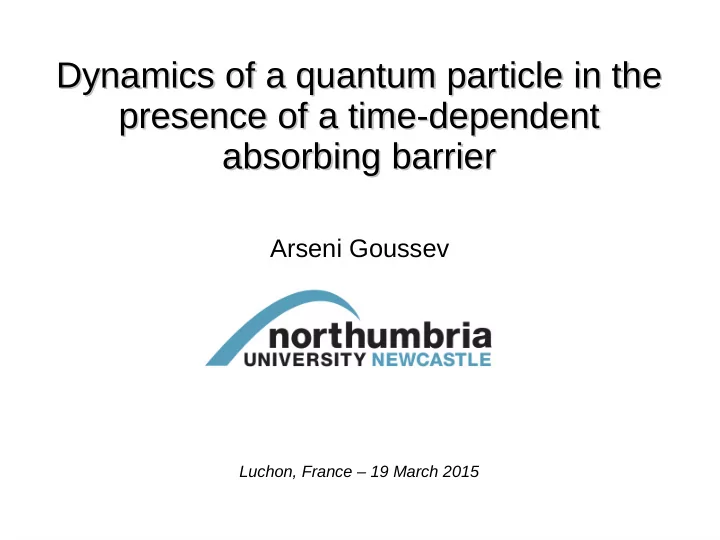

Dynamics of a quantum particle in the Dynamics of a quantum particle in the presence of a time-dependent presence of a time-dependent absorbing barrier absorbing barrier Arseni Goussev Luchon, France – 19 March 2015
Outline Introduction (Moshinsky problem, diffraction in time) Exactly solvable model (Kottler discontinuity) Applications (Diffraction at a time grating, space-time diffraction, matter pulse carving)
Moshinsky problem Completely absorbing shutter is suddenly removed at Beam of When will the “monoenergetic” beam hit the particles detector? Moshinsky, Phys. Rev. 88 , 625 (1952)
Time-dependent Schrödinger equation for with initial condition (“chopped” plane wave) with (average momentum) Exact solution (Moshinsky function) with (classical energy) Moshinsky, Phys. Rev. 88 , 625 (1952)
Probability distribution Fresnel integrals and Cornu spiral Moshinsky, Phys. Rev. 88 , 625 (1952)
Monochromatic light of intensity Wave packet spreading in Fresnel diffraction of light at the Moshinsky shutter problem edge of a semi-infinite screen Moshinsky, Phys. Rev. 88 , 625 (1952)
Generalized Moshinsky problem Transparency of an absorbing barrier depends on time in accordance with a real-valued aperture function varying between 0 (complete absorption) and 1 (full transparency)
Previous results “Time edge” “Time slit” Moshinsky, Phys. Rev. 88 , 625 (1952) Moshinsky, Am. J. Phys. 44 , 1037 (1976) Time-dependent “delta”-potential Scheitler & Kleber, Z. Phys. D 9 , 267 (1988) Dodonov, Man'ko, Nikonov, Phys. Lett. A 162 , 359 (1992) “Source” boundary approach Brukner & Zeilinger, Phys. Rev. A 56 , 3804 (1997) Hils et al., Phys. Rev. A 58 , 4784 (1998) del Campo, Muga, Moshinsky, J. Phys. B 40 , 975 (2007) Godoy, Olvera, del Campo, Physica B 396 , 108 (2007)
Absorbing boundary in stationary wave optics Kottler discontinuity Diffraction of stationary optical waves in three-dimensional space field is continuous inside the opening The field and its normal derivative are source postulated to change discontinuously across the absorbing screen: where = field in free space (in the absence of a screen) The exact solution of Kottler problem is the wave filed predicted by Kirchhoff theory of diffraction! Kottler, Annln Phys. 70 , 405 (1923); Prog. Opt. 4 , 281 (1965)
Kottler discontinuity in time-dependent quantum mechanics where = free-particle wave function (in the absence of a barrier) Goussev, Phys. Rev A 85 , 013626 (2012); Phys. Rev. A 87 , 053621 (2013)
The model Propagator Time-dependent Schrödinger equation for Initial condition Boundary conditions Free particle propagator
Exact solution lie on the same side of the barrier otherwise ● Consistent with Moshinsky shutter propagator and Huygens-Fresnel principle ● Similarities (but also differences) with Brukner & Zeilinger, Phys. Rev. A 56 , 3804 (1997)
Exact solution: Alternative form discontinuous continuous
Composition property (or absence of) In general, the composition property is not fulfilled: However provided the absorbing barrier acts only up to some time , i.e.,
“Time grating” The full propagator admits a closed form expression!
Diffraction of Gaussian wave packets
Extension to two and three spatial dimensions In the transmission region:
Diffraction in space and time
Exponentially opening/closing barrier Initial wave packet: Evolved wave packet: Husimi representation: Steepest descent evaluation for and transmitted wave packet is spatially shifted by Goussev, arXiv:1503.00031
Exponentially changing aperture: Shifting Parameters Pure state Mixed state Pure state Mixed state
Exponentially changing aperture: Splitting
Exponentially changing aperture: Squeezing
Outlook Comparison with a realistic barrier Optimal matter pulse carving Extension to the case of two interacting particles Experiments welcome! References “Matter pulse carving: Manipulating quantum wave packets via time-dependent absorption”, arXiv:1503.00031 “Diffraction in time: An exactly solvable model”, Phys. Rev. A 87 , 053621 (2013) “Huygens-Fresnel-Kirchhoff construction for quantum propagators with application to diffraction in space and time”, Phys. Rev. A 85 , 013626 (2012)
Recommend
More recommend